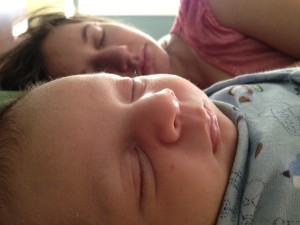As a mother of two young children, the quest for a good night’s sleep at times seems elusive.
Thankfully, for the majority of my life I’ve had little difficulty getting a good night’s rest. Aside from occasional times when I was worried about an exam, I would easily drift off once my head hit the pillow.
That carefree nocturnal landscape has been transformed into countless nights nursing, rocking and soothing my sons back to sleep. With mounting evidence on the detriments of not getting enough sleep and my desire to return to sleeping eight hours per night, I decided to review tips for healthy sleep to aid myself and my patients in getting those much needed “ZZZs.”
First off, I decided to take stock and see how my sleep hygiene compared to the recommendations. I scored pretty well:
- going to bed and waking up at a similar time everyday
- limiting caffeine to a morning cup of coffee
- dimming the lights in the evening
- exercising early in the day
- using my bed solely for sleep
Areas with room for improvement:
- avoiding late night meals
- disconnecting from TV/computers/phones earlier in the evening
- getting rid of my alarm clock
But I love my alarm clock! Unfortunately, clock watching can worsen insomnia, so a better way to wake up might be a dawn simulator. These clever devices have improved sleep in patients with depression and seasonal affective disorder, and benefits may extend to the general public as well. Or try the new alarm clocks that wake you up with scents of coffee or other delectables. Croissant, anyone? If you must stick with your old ticker, turn the clock away from you, or stick it in a drawer while you sleep.
Before reaching for over-the-counter or prescription sleep medications, let’s explore some other tricks that can help you drift off to dreamland. Set your thermostat to 65 F. Cooler temperatures help the body’s core temperature drop, which is needed to initiate sleep. Next, set aside 30 minutes before bed each night to engage in a relaxing activity. Read a book, drink tea, journal, take a bath, or do some gentle, restorative yoga poses. I like to do a simple meditation called the 4-7-8 breath. Learn how to do it here!
If you still are struggling with insomnia, discuss treatment options with your doctor and rule out underlying health conditions that could be contributing to your poor sleep. Hypnotic sleep medications like Ambien, Lunesta or Sonata were initially designed for short-term (7 – 14 days) use. They can be helpful when traveling, during a period of high stress, or to help break a bout of insomnia. Avoid nightly use as they can negatively affect your body’s ability to process new memories, trigger unusual sleep behaviors, and increase the risk of cancer and death.
Common adverse effects include fatigue, dizziness, headaches, nightmares, nausea, and impaired performance on tasks the morning after use. Over-the-counter sleep aids, which generally contain diphenhydramine (the active ingredient in Benadryl) don’t fare much better. Sedatives, such as benzodiazepines, should be avoided due to the risk of dependence.
Melatonin can help improve the time to onset of sleep by ~12 minutes, but the safety of long-term use is not known. If you have been using sleep medications for an extended period of time and wish to stop, or if you prefer to treat your insomnia without medications, try cognitive behavioral therapy for insomnia (CBT-I).
CBT-I examines how your beliefs, behaviors, and other external factors negatively impact the quality of your sleep. CBT-I has been well studied and is shown to be the most effective first-line treatment for chronic insomnia. CBT-I does require more work initially versus taking a sleep medication, but the benefit is long-term and completely without adverse side effects. Additionally, CBT-I has been shown to help treat associated conditions, including depression, PTSD, pain and fibromyalgia. You can work one-on-one with a sleep specialist who is trained in CBT-I or do an online course.
So if you are struggling with falling asleep or staying asleep, first optimize your sleep hygiene. If that still doesn’t get you sleeping soundly, rather than reaching for an easy, short-term fix, invest in doing CBT-I. Your mind and body will thank you.

